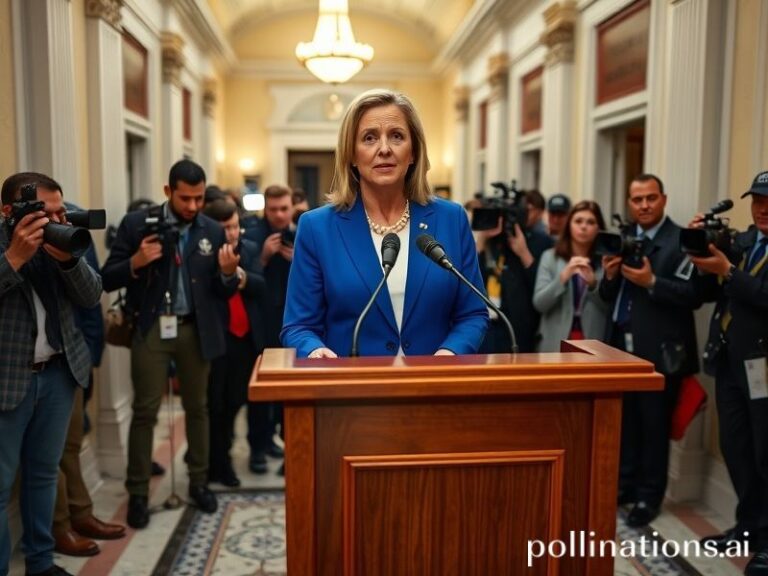Melinda French Gates Unplugged: How a $12.5 Billion Divorce Shook the Global Aid Circus
Melinda French Gates and the Polite Execution of a Philanthropic Empire
By Our Correspondent, somewhere between Seattle and the Swiss tax-haven of your choosing
GENEVA—If you happened to be sipping an overpriced espresso at the UN Palais last week, you could almost hear the global-development sector exhale in relief: Melinda French Gates finally filed the paperwork to leave the Gates Foundation come 2025. The announcement arrived with the diplomatic precision of a Swiss train—on time, softly bell-ringing, and carrying enough cargo to flatten anyone standing on the tracks. After twenty-four years of marriage, three children, and roughly sixty billion dollars in charitable scatterings, the couple that once promised to eradicate malaria will now settle for eradicating joint custody of a 501(c)(3).
For the international chattering classes, the divorce is less a sentimental footnote than a geopolitical weather report. When the richest philanthropic marriage on Earth splits, the aftershock rattles mosquito nets in Malawi, charter schools in Newark, and vaccine cold-chains in Bangladesh—like tectonic plates made of money and good intentions. Suddenly, grant recipients are forced to play “Which billionaire do we thank in the annual report?” while consultants in Geneva race to update their PowerPoint slides before cocktail hour.
French Gates’s exit strategy is itself a masterclass in enlightened self-interest: she walks away with $12.5 billion of her own to burnish her new brand, Pivotal Ventures—because nothing says gender equality like a personal war chest the size of Slovakia’s GDP. The name alone is MBA poetry: “pivotal” hints at levers, fulcrums, world-moving; “ventures” whispers Silicon Valley ROI. Translation: she’ll still save women, but now with better metrics and fewer mosquitoes.
Overseas, the reaction has been a cocktail of gratitude and panic, garnished with the usual sprig of cynicism. In Brussels, development ministers publicly praised her “unwavering commitment to health equity” while privately calculating how many grant proposals they must rewrite. In Nairobi, NGO directors welcomed the fresh cash even as they braced for the inevitable donor workshop titled “Re-Imagining Intersectional Synergies in a Post-Gates Ecosystem.” Translation again: please fill out the same forms, just change the letterhead.
Yet the broader significance lies beyond the balance sheet. French Gates has become the latest poster child for a distinctly 21st-century phenomenon: the philanthropic divorce. It’s marriage as public-private partnership, dissolution as strategic repositioning—complete with impact statements and media rollouts. If the Rockefellers invented modern charity, today’s ultra-wealthy have perfected the charitable uncoupling: conscious, amicable, and tax-deductible. Somewhere in hell, Henry VIII is taking notes.
Her newfound independence also lands at a moment when multilateralism itself is on life support. The WHO is begging for pocket change, the U.S. Congress treats foreign aid like an ATM PIN it can’t remember, and the Global Fund just had to promise Bono a Spotify playlist to keep donations flowing. Into this vacuum glides French Gates, checkbook poised, promising to “put women and girls at the center.” It’s a laudable goal—especially laudable given that the global gender funding gap could swallow Estonia’s annual budget without burping.
Still, observers of human folly can’t help but smile. The same planet that can’t agree to stop burning coal can apparently choreograph a multi-billion-dollar breakup without a single leaked sex tape. The same species that weaponizes water in Sudan now drafts “values-aligned giving” memos served with Evian. Progress, like charity, begins at home—preferably one with a waterfront view.
And so the caravan moves on. Bill will continue tinkering with nuclear reactors and reinventing the toilet—because nothing says “I’ve moved on” like a small-scale plutonium plant. Melinda will deploy her $12.5 billion to nudge the patriarchy, one board seat at a time. The rest of us will watch, caffeinated and vaguely hopeful, pretending that the future of civilization hinges on which billionaire signs the grant letter. Spoiler: it does and it doesn’t. But in a world where public trust is scarcer than a mosquito in December, we’ll take our moral leadership wherever we can buy it.







